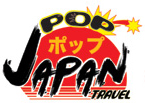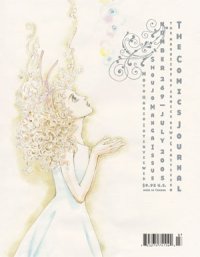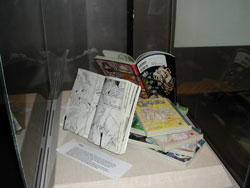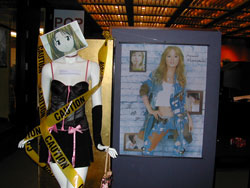Otaku Unite! to be distributed by Central Park Media
 The anime fandom documentary Otaku Unite! will be released on DVD by Central Park Media (no release date announced as of yet). Here is the full story: http://www.toymania.com/news/messages/6880.shtml
The anime fandom documentary Otaku Unite! will be released on DVD by Central Park Media (no release date announced as of yet). Here is the full story: http://www.toymania.com/news/messages/6880.shtmlI was really excited to hear about this because I helped out a little on the project. When I found out that Eric Bresler, the director, was working on the documentary, I immediately contacted him to find out how I could help. I didn't meet Eric in person until Anime Weekend Atlanta 2003, where I had the privilege of presenting a copy of the movie to Toshio Okada, who was a guest at that con. With Eric's help, I was able to interview Toshio Okada at AWA, which Eric videotaped. That interview is still unpublished, but with the new interest in Otaku Unite!, maybe that will change soon. Anyhow, I heartily recommend Otaku Unite! to anyone who is interested in anime fandom and the history of anime in the United States.
Otaku article in SF Gate
SFGate.com, the website of the San Francisco Chronicle, recently ran an article by columnist Jeff Yang called "ASIAN POP Generation O / Meet the otaku". In this article, he talks about Anime Expo, Otaku Unite!, anime fandom in the United States, changing perceptions of otaku in Japan, and the cross-cultural implications of otaku culture. Of course, these are all topics close to my own heart. As it turns out, Jeff Yang introduced himself to me at one of my recent Japan Society talks, and he interviewed me over the telephone for this article. I seem to think we talked for at least an hour even though I'm only quoted once, but I won't complain. The article was well-researched and informative--something that we need more of when it comes to public discourse about otaku culture. It was also fun to read, which is always a plus.
Seven Days in Japan wins "Best Documentary" award at San Diego Comic Con
 Joe Doughrity, an anime fan and writer from Los Angeles, attended a Pop Japan Travel tour to Japan in 2004 and made a documentary about it called Seven Days in Japan which recently won the "Best Documentary" award at San Diego Comic-Con. You can find a trailer on the movie's website, as well as ordering information. Having attended a PJT tour myself in February, I'm really curious and excited to see Joe Doughrity's work. I already placed an order, and will be watching it as soon as it arrives.
Joe Doughrity, an anime fan and writer from Los Angeles, attended a Pop Japan Travel tour to Japan in 2004 and made a documentary about it called Seven Days in Japan which recently won the "Best Documentary" award at San Diego Comic-Con. You can find a trailer on the movie's website, as well as ordering information. Having attended a PJT tour myself in February, I'm really curious and excited to see Joe Doughrity's work. I already placed an order, and will be watching it as soon as it arrives.The Comics Journal special issue on shoujo manga
 This isn't directly otaku-related, but those of you who have an academic interest in anime and manga might like to examine the latest issue of The Comics Journal. The July issue (#269), featuring beautiful cover art by Moto Hagio, focuses heavily on shoujo manga. It features reviews of shoujo manga, essays about shoujo manga, and an in-depth interview with Moto Hagio. For those of you who aren't so interested in shoujo, there's an interesting article about scanlations, and an article about manga and comic book shops.
This isn't directly otaku-related, but those of you who have an academic interest in anime and manga might like to examine the latest issue of The Comics Journal. The July issue (#269), featuring beautiful cover art by Moto Hagio, focuses heavily on shoujo manga. It features reviews of shoujo manga, essays about shoujo manga, and an in-depth interview with Moto Hagio. For those of you who aren't so interested in shoujo, there's an interesting article about scanlations, and an article about manga and comic book shops.A full table of contents, as well as a few of the articles and some excerpts, can be found here: http://tcj.com/269/index.html. One of the essays, "Filling the Void", briefly quotes me. (The author, Kai-Ming Cha, interviewed me over email a few months back.) I found my copy at Borders, so it shouldn't be too hard to find.
Student exhibit at Japan Society
On July 6th, I gave yet another lecture on otaku culture at Japan Society. This time, I was addressing the participants of a program called Experience Otaku! Create an Exhibition: An interactive Exploration of Contemporary Art & Culture for High School Students.
The students explored the Murakami exhibit at Japan Society, and learned about contemporary art and gallery exhibitions in general. Their final project was to create their own exhibit highlighting the issues behind something important in their own lives. Since all the participants were fans of anime and manga, they decided to make their exhibit about that--the complexitities of being teenage anime and manga fans in America.


In addition to delivering my lecture, I went to the one-day exhibit (entitled "Pop Bunmei Kaika") on July 15th and was very impressed by the student work. It's a shame the exhibit couldn't have been more permament (all the displayed materials belonged to the kids, making any long-term exhibit impossible). From interacting with the teens who participated in the two Japan Society education programs I was involved with, it became very clear to me that this latest generation of American otaku is a force to be reckoned with. The mainstreaming of anime in the United States means that there will be more newbies at any given time, but it also means that more and more anime fans are becoming experienced and savvy younger than ever.
"Trainman" otaku makes waves in Japan
 Awareness of otaku culture is very high right now in Japan due to a story called Densha Otoko which translates to "trainman". Supposedly a true story, Densha Otoko is about an otaku who saves a beautiful woman from a drunk on a train. She sends him a thank-you gift, and our poor otaku protagonist is interested in pursuing a relationship with the woman but is clueless on how to proceed. As such, he explains his plight on 2ch (ni-chaneru), an online bulletin board, and gets advice from his fellow otaku. The story was published as a best-selling book, and was recently made into a movie which hit #1 at the Japanese box office. There's even a manga. A few weeks ago, the Densha Otoko TV drama premiered, which I am currently in the process of watching. Some otaku will recognize the opening animation sequence of the TV show as being an homage to the Daicon IV Opening Animation, which you can read about here: http://www.cjas.org/~leng/daitrivia.htm#densha
Awareness of otaku culture is very high right now in Japan due to a story called Densha Otoko which translates to "trainman". Supposedly a true story, Densha Otoko is about an otaku who saves a beautiful woman from a drunk on a train. She sends him a thank-you gift, and our poor otaku protagonist is interested in pursuing a relationship with the woman but is clueless on how to proceed. As such, he explains his plight on 2ch (ni-chaneru), an online bulletin board, and gets advice from his fellow otaku. The story was published as a best-selling book, and was recently made into a movie which hit #1 at the Japanese box office. There's even a manga. A few weeks ago, the Densha Otoko TV drama premiered, which I am currently in the process of watching. Some otaku will recognize the opening animation sequence of the TV show as being an homage to the Daicon IV Opening Animation, which you can read about here: http://www.cjas.org/~leng/daitrivia.htm#denshaDensha Otoko has made big enough of an impact to draw the attention of some outspoken critics. Here are two articles responding to the Densha Otoko phenomenon that question the worth of otaku culture to Japanese society. While I don't agree with many of their conclusions, it's part of my research to keep track of how people are perceiving otaku, positively or negatively, and as far as criticisms go, these two are fairly interesting. At the very least, they indicate that otaku culture is currently very strong in the public consciousness of Japan.
New horizons beckon as Train Man heads nowhere fast
Pointing out how otaku seem worthless is a much easier task for most people than explaining otaku culture's value to society. The easy way isn't always the best way, of course, which is why I think it's worthwhile to find and analyze the positive aspects of otaku-ism.
Denpa Otoko as a critique of Densha Otoko
It is interesting to note that some within Japan's otaku communities do not approve of the Densha Otoko story. This attitude is highlighted in the book by Toru Honda called Denpa Otoko, which translates to "radio wave man". You can read about it here: A world of his own: Create, erase, redraw
As far as Honda is concerned, the protagonist of Densha Otoko sold out, becoming less of an otaku for the sake of a woman. He feels that otaku culture is superior to mainstream culture, and that fantasy relationships with fictional females are better than real relationships with real women. This, of course, is a somewhat extreme position coming from a particular subset of otaku culture that is not representative of all (or even most) otaku, but that doesn't mean he should be ignored. From reading the article, and thinking about the otaku that I've met, I don't think that Honda's experience (as a child, especially) is typical, but it does highlight some of the negative pressures put on youth (in both Japan and the US) that cause them to seek belonging in one or more subcultures.
Otaku test draws attention in Japan
Here's an article that came out a few weeks ago describing an otaku test that will be administered by the publishing company Biblos in the August 5th issue of Elfics magazine. The top 100 scorers will receive a special certificate and bragging rights. One of the purported goals of the exam is to boost the status of otaku culture in Japan.
I like the sentiment, I really do, but it seems like the exam is mostly trivia-based (historical details about Comiket and video game consoles, for example). I am not against otaku trivia contests by any means (representatives of my anime club have done very well in the Otakon game show almost every year since 1996; I was a participant myself in 1997--see image below), but knowledge of trivia is, to me, one of the least interesting ways to identify who is or isn't an otaku, or who is more otaku than anyone else. If it's true that one can be an otaku of anything, how can you come up with a set of trivia questions that is fair to all the different kinds of otaku? At best, you can create a test specifically for anime otaku, or game otaku, or Comiket otaku, etc., but even those categories are be too broad.
Personally, I prefer otaku tests that focus on types of behaviors instead of specific behaviors and specific knowledge. One example that approaches that is the following:
Even that test (co-written by a friend of mine from college, as it turns out) is more about specific achievements and specific behaviors than attitude and generalized behaviors. To me, being an otaku means having an approach to life that is characterized by a particular set of strategies of engaging media (and other technologies) and a specific philosophy about (and longing for) information. These strategies and philosophical ideas cannot be distilled into specific behaviors and specific knowledge. Creating a written test to quantify otaku-ism meaningfully, therefore, is difficult at best.
As such, my studies of otaku are mostly qualitative. After all, with the right mix of attitudes and behaviors, a newbie who has only been watching anime for 3 months can be more of an otaku than someone who has been watching anime for 20 years. Quantitative otaku tests, even though they are fun, don't address that very well.

me, Jerry Hsu, and Greg Marques (CJASers, all) at the Otakon '97 game show
Here is a review of Seven Days in Japan: http://www.filmthreat.com/index.php?section=reviews&Id=8228
ReplyDelete